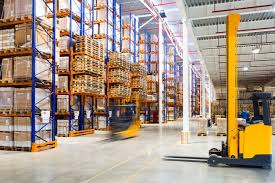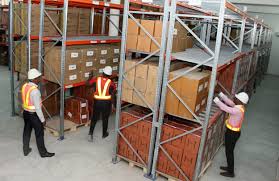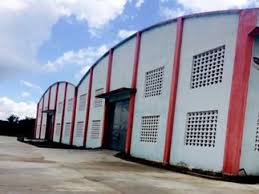![]()
If you’ve landed on this article page, you’re probably searching for a
good business idea—an idea that’s light on the pocket but heavy on
returns, promising both a fulfilling journey and potential profit.
|
How
to Start a Warehouse Business in Nigeria
Warehousing is an important part of the logistics and 3PL supply
chain management process in Nigeria. It involves the storing of
goods and materials in a safe and secure environment, away from
the elements. Warehouses also play a vital role in ensuring the
smooth flow of goods and materials through the supply chain.
Warehousing has been around for centuries, but it has become
increasingly important in recent years as global trade has
increased. The role of warehouses has also changed over time,
with many now incorporating cutting-edge technology to improve
efficiency and accuracy.
There are four key elements of warehousing: location, stock
management, transportation, and facilities.
Location is critical to a warehouse’s success. The best location
is close to customers and suppliers, with good access to
transportation infrastructure.
Stock management is the process of tracking inventory and
keeping it organized. Good stock management ensures that
products are available when customers need them and that the
warehouse is not overstocked.
Transportation is how products get in and out of the warehouse.
A good transportation system is efficient and cost-effective.
Facilities are the buildings and equipment used to store and
move inventory. They must be well-maintained to protect
inventory and ensure safety.
What is grade a warehousing?
Grade A warehouses are the highest quality and most expensive
warehouses. They are usually brand new or have been recently
renovated and offer state-of-the-art features and amenities.
Grade A warehouses are typically located in prime locations near
major transportation routes, making them convenient for
businesses that need to ship goods regularly.
What is international-standard warehousing?
International-standard warehousing is a type of storage facility
that meets specific criteria for safety, security, and
efficiency. These standards are set by the International
Organization for Standardization (ISO), and facilities that meet
them are typically referred to as “ISO-compliant.”
Why should you use international-standard, grade a warehouses?
If you’re in the business of importing or exporting goods, you
know that having a reliable, high-quality warehouse is essential
to your success. That’s why more and more businesses are
choosing to use international-standard, grade A warehouses.
They offer superior security.
Grade A warehouses have state-of-the-art security systems in
place, including perimeter walls, CCTV, alarm systems, and
guards. This means that your goods will be safe and secure at
all times.
They have the latest technology.
Grade A warehouses are equipped with the latest technology,
which allows for more efficient storage and retrieval of goods.
This means you’ll be able to get your goods in and out of the
warehouse quickly and without any problems.
They’re climate-controlled.
Grade A warehouses are climate-controlled, which means that your
goods will be protected from extreme temperatures and humidity.
This is essential for ensuring that your goods remain in good
condition.
They have a team of experienced professionals.
Grade A warehouses have a team of experienced facilities
management professionals who can help you with all your storage
and logistics needs. This means you’ll have peace of mind
knowing that your goods are in good hands.
They’re located in strategic locations.
Grade A warehouses are typically located in strategic locations,
which makes it easy for you to access your goods. This can save
you time and money in the long run.
What are the Prime Locations for Warehouses in Nigeria?
The demand for warehouses in Nigeria is high. However, with so
many options available, deciding which location is best for your
warehouse can be challenging.
There are a few factors to consider when choosing a location for
your warehouse in Nigeria. First, consider the size and type of
warehouse you need. If you are storing large quantities of
goods, you will need a larger warehouse than if you are only
storing a few items.
Second, you need to consider the proximity of your warehouse to
your customers. If your customers are located far from your
warehouse, they may be less likely to use your services.
Finally, you need to consider the cost of renting or purchasing
a warehouse in Nigeria. The cost of warehouses can vary
significantly depending on the location and size.
What are the Prime Warehousing Locations in Lagos – Lagos Ibadan
Expressway?
There are many factors to consider when choosing a warehousing
location, but some of the most important ones are proximity to
transport infrastructure and markets and the availability of
skilled labor.
The Lagos Ibadan Expressway is one of the busiest highways in
Nigeria and offers excellent access to both Lagos and Ibadan,
the largest and third-largest cities in the country. There are
many warehouses located along the expressway, making it a prime
location for businesses that need to store and distribute their
products.
What kinds of companies could benefit from having modern,
secure, clean, spacious warehousing space near Nigeria’s largest
city and commercial center (FMCG; other consumer products; oil &
gas; industrial/mechanical; foods and commodities;
health/pharmaceutical; etc.)?
As Nigeria’s largest city and commercial center, Lagos is a hub
for businesses of all kinds. And with its growing population and
economy, the demand for space – especially modern, secure,
clean, spacious warehousing space – is only increasing.
So, what kind of companies could benefit from this type of space
near Lagos?
FMCG companies, Consumer product companies: Oil & gas companies,
Industrial/ mechanical companies, Foods and commodities
companies, Health/pharmaceutical companies, etc.
As the economic hub of Nigeria, Lagos is home to many businesses
and industries. The city is also a major transportation hub,
with an extensive network of roads, railways, and waterways.
This makes it an ideal location for companies that need to
transport goods to and from other parts of the country.
It’s important for companies to have modern, clean, secure
facilities near Lagos for light manufacturing, processing,
assembly, and other operations. These facilities should be
located in an industrial area connected to the city’s
transportation network. They should also be large enough to
accommodate the company’s needs.
A warehouse is a building used to store raw materials or
manufactured goods. They are most commonly used by
manufacturers, wholesalers, and transport businesses, among a
variety of other business types. In most cases, warehouses are
built in central locations, allowing them to work with and
distribute goods to many businesses in their vicinity.
Beyond the cost of acquiring or renovating a warehouse space,
remember to factor in other expenses including the cost of
equipment, permit or licensing fees, and employee wages.
Depending on your needs, you may also have to pay for software,
inventory, and marketing costs.
Buying a warehouse: If you can afford to do it, buying an
existing warehouse can be beneficial. Owning the property allows
you to make changes as you see fit, and makes it possible to
earn a profit should you ever choose to move on from it.
However, it's important to note the risks associated with buying
a warehouse property. The high upfront cost and mortgage
payments can be burdensome, especially for new warehouse
businesses with an unclear future.
Buy Equipment
Without proper equipment, it will be difficult to succeed in the
warehousing industry. Due to the nature of the business and the
physical demands that moving and storing products requires, each
section of your warehouse will need specific types of tools,
machines, and vehicles. Not only do these make the job easier
for your employees, but they also help to keep your working
environment safe. The equipment you'll need can be sorted into
distinct categories, such as:
Conveyors: Gravity roller conveyors, belt conveyors, flexible
conveyors, vertical conveyors, spiral conveyors, chain
conveyors, and automotive conveyors
Storage equipment: Bins, shelves, racks, and carousels
Lifting equipment: Forklifts, pallet jacks, pallet trucks, hand
trucks, service carts, cranes, hoists, dollies, and castors
Packing equipment: Industrial scales, strapping machines,
stretch wrap, and packing tables
Hire Staff
No warehouse can function without qualified and dedicated
employees. A successful warehouse owner should familiarize
themselves with the different jobs associated with the industry
and why they are important. Keep in mind that while many
warehouses will have similar types of employees on staff,
different types of warehouses may necessitate specialized
positions. The following are some of the most common jobs found
in warehouses:
Get our Practical Training Guide on How to start a warehousing Business in Nigeria. This guide will provide a detailed roadmap on how to start a logistics company in Nigeria, from market research to operational strategies, ensuring you have all the information needed to succeed in the logistics industry in Nigeria.
|










